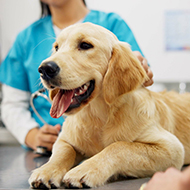Vaccine offers hope in fight against major chicken disease

The recombinant vaccines have potential to be more cost-effective and respond to emerging new virus strains.
Researchers have developed a new vaccine strategy that could help chickens in the fight against infectious bronchitis.
Current vaccines that protect against infectious bronchitis guard against some strains of the virus, but not others. Scientists believe these failures are associated with differences in the spike protein - the protein which enables the virus to attach to and enter cells - between strains of the virus.
Writing in the Journal Of Virology, researchers describe how they tested a new approach using a specialist type of vaccine, known as recombinant virus vaccine. These vaccines use harmless or weak versions of a virus or bacteria to introduce microbes into cells into the body.
The team used recombinant viruses with different spike proteins as vaccines to build two versions of a harmless virus. They found that the vaccine offered partial protection against infectious bronchitis virus, but further research is needed to develop a more robust vaccine.
Researchers say the recombinant vaccines have potential to be more cost-effective and respond to emerging new virus strains. The next step will be to develop a vaccine that remains harmless but induces a stronger immune response.
Professor Lonneke Vervelde, who led the study at the University’s Roslin Institute, said: “There is a real need to develop new vaccines against infectious bronchitis that protect against multiple strains and offer rapid responses. We are trying to make a vaccine that offers broad protection, but further research is needed to develop a more robust vaccine.”
Dr Erica Bickerton at the Pirbright Institute, who also took part in the study, said: “Our research hopes to develop more cost-effective and efficient commercial vaccines that are capable of protecting chickens against this serious disease.”



 The CMA has invited comments on a draft survey invitation letter, as it continues its investigation into consumer experience.
The CMA has invited comments on a draft survey invitation letter, as it continues its investigation into consumer experience.